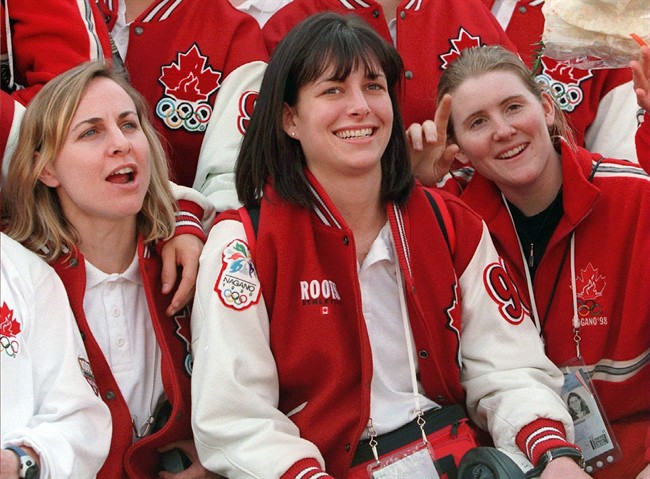KAMLOOPS, B.C. – Three of Hayley Wickenheiser’s Canadian teammates weren’t born when she won her first women’s world hockey championship in 1994.

Defenceman Halli Krzyzaniak was 12 years old when she first saw Wickenheiser play in the 2007 world championship final in Winnipeg. When Krzyzaniak scored her first career goal for Canada in an exhibition game Saturday against Sweden, her childhood idol provided an assist.
“That was just surreal for me to say she was in on my first goal because I never thought that would have happened,” Krzyzaniak said.
“For my generation, she was someone we really looked up to and kind of idolized and wanted to be, but I never thought I would be playing with her.”
A few surgeons also thought Wickenheiser wouldn’t be around to play with Krzyzaniak, but the 37-year-old from Shaunavon, Sask., is playing in her 13th women’s world hockey championship this week in Kamloops with eight screws and a metal plate in the navicular bone of her left foot.
Wickenheiser chose a more optimistic surgeon when she underwent foot surgery in February, 2015.
“There’s a lot of hardware in there,” Wickenheiser said. “I didn’t know if I’d play again. A lot of doctors said I could never play again. One guy said I could and I went with that guy.”
Canada’s all-time leading scorer in goals (168), assists (210) and games played (271) is also the all-time points leader in world championships with 85, including 37 goals.
She and Finland’s Karoliina Rantamaki are tied for the most world championship appearances. Wickenheiser did not play in 2001 because of knee injury nor last year in Malmo, Sweden, because of her foot surgery.

Get breaking National news
She’s not the oldest player in Kamloops this year. Riikka Valila, 42, plays forward for Finland. An eighth career world championship gold medal would put Wickenheiser second all-time behind former teammate Danielle Goyette with nine.
Wickenheiser has worn the Maple Leaf in international hockey for over two decades now. The five-foot-10, 162-pound forward intends to wear it in a sixth Winter Olympic Games in 2018 and pursue a fifth gold medal.
“If you ask any player that plays a long time, there obviously has to be a passion for the game,” Wickenheiser said. “I love to come to the rink and the grind of training and the day-in and day-out things that go into playing is what I enjoy the most.”
Wickenheiser took a slapshot off her foot during a Four Nations Cup practice in 2012. What she thought was a bone bruise didn’t heal. Another half dozen shots off that bone made it worse.
Wickenheiser soldiered through the 2014 Winter Olympics with a broken bone in her foot. Surgery later that year didn’t remedy the problem, so Wickenheiser pulled the plug early on her 2014-15 season to undergo the more extensive procedure.
She couldn’t put weight on her foot for four months post-surgery, so Wickenheiser did one-legged windsprints using a scooter and wrapped her cast in a garbage bag so she could swim laps.
“I did a lot of crazy things. I was training 12 days out of surgery,” she said. “You find different ways how to be successful when something like that happens. That would not be the way I would like to end my career.
“It’s a long road back for me. Personally, it’s pretty sweet.”
Her role on the Canadian team has changed. She’s no longer the goalscoring star, but Wickenheiser’s creativity and smarts with the puck, big shot and sheer toughness make her still effective.
Wickenheiser wore the captain’s ‘C’ from 2007 to 2013, but Hockey Canada is now grooming others to wear letters. Marie-Philip Poulin, 25, was named Canada’s captain for second straight year Monday.
Wickenheiser considers herself a player-mentor to Poulin, Natalie Spooner, Laura Fortino and Brianne Jenner, whom Hockey Canada has tabbed as future leaders.
From attending a Philadelphia Flyers rookie camp to stints in men’s pro leagues in Finland and Sweden to her more than 20 years playing international women’s hockey, Wickenheiser owns experience no other woman in hockey has.
She wants to share it before she’s done playing.
“Part of my role in the evolution of the team is to still lead, but lead in a different way than I have in the past,” Wickenheiser said.
“It’s kind of an exciting different challenge for me, which I enjoy — trying to help the young players who will be leading the team into the future when I’m not playing anymore.”







Comments